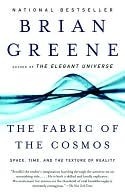More on this book
Community
Kindle Notes & Highlights
by
Brian Greene
Read between
July 20, 2018 - June 2, 2019
Space and time adjust themselves in an exactly compensating manner so that observations of light’s speed yield the same result, regardless of the observer’s velocity.
Special relativity declares a similar law for all motion: the combined speed of any object’s motion through space and its motion through time is always precisely equal to the speed of light.
Time stops when traveling at the speed of light through space. A watch worn by a particle of light would not tick at all.
observers in relative motion do not agree on simultaneity—they do not agree on what things happen at the same time.
In one of those flashes of insight that scientists spend a lifetime longing for, Einstein realized that gravity and accelerated motion are two sides of the same coin.
Newton’s flawed conceptions of absolute space and absolute time work wonderfully well at the slow speeds and moderate gravity we encounter in daily life, so our senses are under no evolutionary pressure to develop relativistic acumen. Deep awareness and true understanding therefore require that we diligently use our intellect to fill in the gaps left by our senses.
Human language is far better at capturing human experience than at expressing deep physical laws.
(a famously caustic scientist whose appreciation for symmetry led him to call his colleagues spherical bastards because, he explained, they were bastards any way you looked at them19),
According to inflation, the more than 100 billion galaxies, sparkling throughout space like heavenly diamonds, are nothing but quantum mechanics writ large across the sky. To me, this realization is one of the greatest wonders of the modern scientific age.


